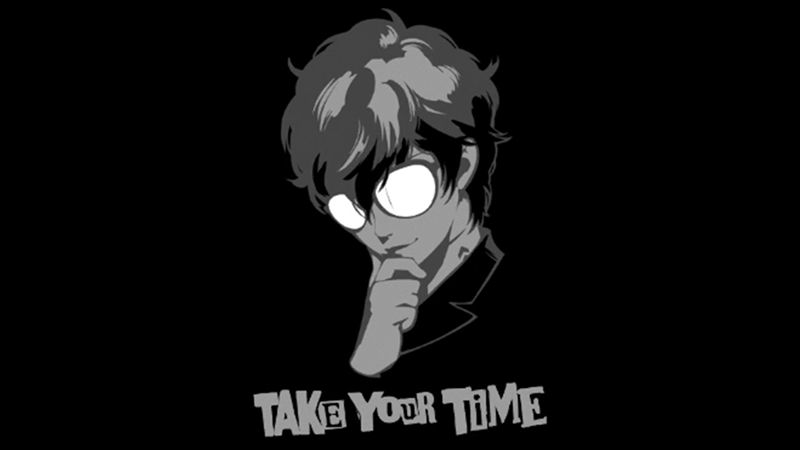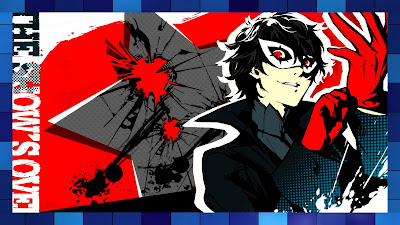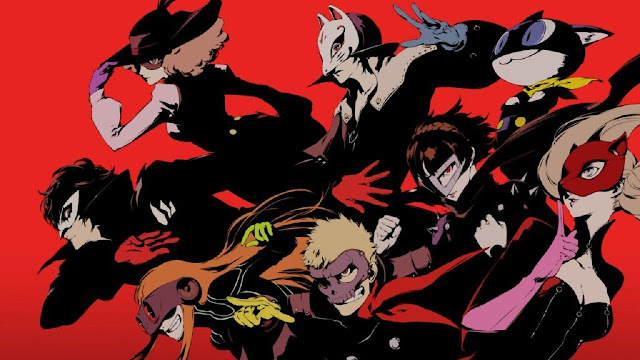 When you boot up any video game one of the first things you will most likely see is a loading screen of some sort. They come in various shapes and forms such as screens that display helpful tips or having some quirky interactive element to kill time. One of Persona 5's loading screens is a simple portrait of the protagonist with the words "Take Your Time" below. It's the only loading screen I can think of that shows a central motif of a game. The idea of "taking your time" permeates the entirety of Persona 5's experience from the way it methodically tells its story, to the way you slowly build relationships with characters, to the meticulous infiltration of Palaces. Of course, the sentiment extends to the game's turn-based combat as well.
When you boot up any video game one of the first things you will most likely see is a loading screen of some sort. They come in various shapes and forms such as screens that display helpful tips or having some quirky interactive element to kill time. One of Persona 5's loading screens is a simple portrait of the protagonist with the words "Take Your Time" below. It's the only loading screen I can think of that shows a central motif of a game. The idea of "taking your time" permeates the entirety of Persona 5's experience from the way it methodically tells its story, to the way you slowly build relationships with characters, to the meticulous infiltration of Palaces. Of course, the sentiment extends to the game's turn-based combat as well.By definition a turn-based combat system in a well balanced game requires the player to carefully contemplate their decisions to achieve victory over their enemies. Turn-based combat systems were prevalent on home consoles up through the end of the PS2 generation. Big-name, AAA companies like Square Enix, Bandai Namco, Atlus, and many others put out game after game that utilized turn-based combat. Upon entering the HD era of gaming, however, there was a paradigm shift in how games were presented. Developers wanted to utilize the greatly enhanced graphics to provide players with more grandiose, cinematic experiences and the stop-go nature of turn-based combat limited that ability to do so. As a result the game industry started to see less and less turn-based combat games on home consoles from AAA developers. Instead, active time elements became more prevalent as developers sought systems to keep players more involved in battles and lessen the disconnect felt from definitive turns. As a result, true turn based combat systems found a new home on handheld systems where there is less emphasis on creating dazzling set pieces (although the Switch may change this notion in the future). Series such as Bravely Default found a solid foothold on the 3DS while the long-running Final Fantasy franchise turned full action RPG on home consoles with Final Fantasy XV. The only console games to have come out in recent years from a AAA developer that features a true turn-based combat system are Tokyo Mirage Session #FE, Paper Mario: Color Splash and now Persona 5. While TMS#FE and Paper Mario were fine games on their own rights the combat didn't have that console quality spark to it; the aspect that made them feel at home on a console rather than a handheld. Persona 5, on the other hand, does. It plants its foot firmly on the ground and declares loudly, "I am a turn-based RPG and I deserve to be on consoles." Something about Persona 5's combat gives it that cinematic quality that console games seek and what that something is is what I want to discuss in this piece.
 Persona 5 battles put on a show, but that show starts before the battles themselves do as even engaging enemy symbols on the field feels empowering and proactive. While most RPG's are content with simply having the player swing their sword at an enemy symbol then cutting arbitrarily to the battle arena, Persona 5 takes it many steps further. As you slip from cover to cover you approach the unsuspecting enemy until they are within striking range. A simple press of a button causes the protagonist to leap upon the enemy's shoulder and rip their mask off from which shadows pour forth and spill onto the ground. From the puddles of shadows enemies emerge, dazed and confused as the word "AMBUSH!!!" pulsates above in bold, comic book style letters. The sequence as a whole is a visceral experience and immensely satisfying to the player as it makes them feel like they have accomplished something before the battle has even begun.
Persona 5 battles put on a show, but that show starts before the battles themselves do as even engaging enemy symbols on the field feels empowering and proactive. While most RPG's are content with simply having the player swing their sword at an enemy symbol then cutting arbitrarily to the battle arena, Persona 5 takes it many steps further. As you slip from cover to cover you approach the unsuspecting enemy until they are within striking range. A simple press of a button causes the protagonist to leap upon the enemy's shoulder and rip their mask off from which shadows pour forth and spill onto the ground. From the puddles of shadows enemies emerge, dazed and confused as the word "AMBUSH!!!" pulsates above in bold, comic book style letters. The sequence as a whole is a visceral experience and immensely satisfying to the player as it makes them feel like they have accomplished something before the battle has even begun. Enemy engagement is part of the presentation that Persona 5 flaunts with pride. As with any presentation, visuals and sound are key, both of which the Persona series is no stranger to. The sharp character models and extravagant colors make the battlefield sizzle with flair while the smooth jazz that accompanies it all lights a cold passion in the heart that fits right in place with the game's thievery and heist motif. Presentation is the foundation of the game's battles but it alone is not enough to elevate the battles to that console level of quality. What matters even more is how the battles feel, if it feels like you are simply pressing buttons and selecting actions from a menu or if it feels like something more. This aspect is where Persona 5's battles truly shine.
 While at its core battles really are simply selecting actions to perform, it's the snappiness of those selections that grants satisfaction. Each action being assigned to a single button press rather than menu based is something you would oft see in an action game rather than a turn based RPG. Attack is X, guard is O, triangle are your skills, and your gun if up on the D-pad. Sound familiar? Being able to instantly perform an action with a single button press provides a much smoother experience over the standard menu interface the vast majority of turn-based games use. The ability to automatically target an enemy's weakness with R1 cuts down further on what little menu time there is. Even when you do have to cycle through your Personas, which does involve a menu, the protagonist calls out the name of each you summon in a passionate shout giving each decision a noticeable weight to them.
While at its core battles really are simply selecting actions to perform, it's the snappiness of those selections that grants satisfaction. Each action being assigned to a single button press rather than menu based is something you would oft see in an action game rather than a turn based RPG. Attack is X, guard is O, triangle are your skills, and your gun if up on the D-pad. Sound familiar? Being able to instantly perform an action with a single button press provides a much smoother experience over the standard menu interface the vast majority of turn-based games use. The ability to automatically target an enemy's weakness with R1 cuts down further on what little menu time there is. Even when you do have to cycle through your Personas, which does involve a menu, the protagonist calls out the name of each you summon in a passionate shout giving each decision a noticeable weight to them.Speaking of shouts, it would be remiss to talk about Persona 5 battles without talking about the constant chatter and interactions between party members. Every action you take, and many you just contemplate, are reacted to by your party members, usually whoever your dungeon navigator is at the time. The number of unique voice lines is absolutely staggering and there is always one that matches the situation you're in. The constant reactions and feedback provide an urgency that the player is embroiled in this epic battle and isn't something as simple as one side taking turns attacking the other until one is defeated. Your party members encourage you to to keep your head in the game no matter the circumstances and to stay focused until the enemy is annihilated or surrounded in a Hold Up.
 The Hold Up mechanic is the final piece of the puzzle and one that adds that extra layer of depth to take the Persona 5 battles to a new level. There are few RPG's out there that give you an outcome to battle that isn't either "Win", "Run", or "Defeat". Even prior Persona games were like that until 5 came around with Hold Ups. By hitting every enemy's weakness and knocking them to the ground your party will close in and surround them at gunpoint in a Hold Up. You are in a position of power, one that you put in the effort to achieve and the shadows are at your mercy. The situation lends credibility to your ability to convince the shadow to then join you or to cough up money and/or items. It's just one extra thing for the player to try to achieve rather than mindlessly mashing the attack button to end a battle as soon as possible. If you aren't feeling quite so merciful, however, you can finish the enemies off with a flashy All-Out Attack that decimates the opposition. These dazzling finishers that are unique to the character who initiated it are an extremely satisfying way to end the encounter.
The Hold Up mechanic is the final piece of the puzzle and one that adds that extra layer of depth to take the Persona 5 battles to a new level. There are few RPG's out there that give you an outcome to battle that isn't either "Win", "Run", or "Defeat". Even prior Persona games were like that until 5 came around with Hold Ups. By hitting every enemy's weakness and knocking them to the ground your party will close in and surround them at gunpoint in a Hold Up. You are in a position of power, one that you put in the effort to achieve and the shadows are at your mercy. The situation lends credibility to your ability to convince the shadow to then join you or to cough up money and/or items. It's just one extra thing for the player to try to achieve rather than mindlessly mashing the attack button to end a battle as soon as possible. If you aren't feeling quite so merciful, however, you can finish the enemies off with a flashy All-Out Attack that decimates the opposition. These dazzling finishers that are unique to the character who initiated it are an extremely satisfying way to end the encounter.What I have been trying to say with all of this is that Persona 5's battles put on a extravagant show. From the moment the curtain raises on an ambush to the moment they fall with an All-Out Attack, each action flows smoothly from one to the next. Instead of playing a game it feels more akin to conducting an orchestra, where you simply provide a general direction and the game plays itself (which you could literally do if you command your party members to act on their own). Each and every battle has a fluidity so rarely found in other turn-based RPG's that makes the player feel like part of the experience, just as more action oriented games aim to achieve. It is for these reasons that Persona 5 truly deserves to be played on a home console and no matter how far graphics advance in the future or how much the console market leans towards action games that fact will not change. Take your time, and the show will go on.

No comments:
Post a Comment